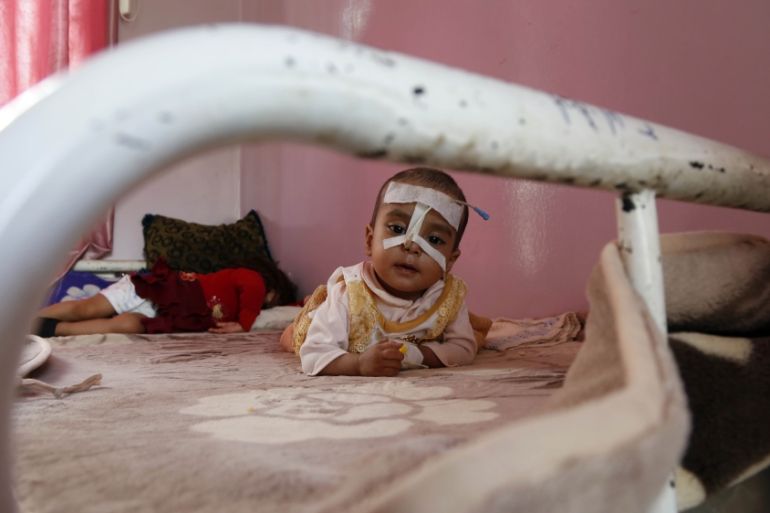Civilians pay human cost of Yemen’s war, rights group says
Mwatana urges UN Human Rights Council to create a commission of inquiry to bring all perpetrators to justice.

A Yemeni human rights group says civilians are paying the human cost of the country’s five-year war, while steps to bring perpetrators to account are lacking.
In an annual report released on Tuesday in Paris, Mwatana for Human Rights says humanitarian aid has been blocked at a time of impending famine while civilians can no longer move around the country freely or leave.
The group documented 74 cases of obstructing aid or access, largely blaming Iran-backed Houthis, who have been fighting against a Saudi-led coalition allied with the Yemen government since 2015.
The report said the Yemeni government and coalition forces have also obstructed aid, while millions of civilians in Yemen struggle to feed themselves and their families.
The report stressed that the Yemen government cannot address the humanitarian crisis without addressing the human rights issues and urged the United Nations Human Rights Council to create a commission of inquiry by September.
Based on more than 2,000 interviews with Yemenis, the rights group documented 52 cases of landmines wounding civilians and 150 coalition air attacks, together killing at least 435 people.
Air attacks and shelling have killed and wounded civilians in schools, hospitals and healthcare facilities, the report noted.
The report said the Houthis, the UAE proxy forces and the Yemeni government forces disappeared, tortured and arbitrarily arrested scores.
Saudi Arabia arrested and abused Yemeni fishermen inside the kingdom, it said.
Both Houthis and forces loyal to the coalition and Yemeni government have continued to launch indiscriminate ground attacks and recruit children.
Saudi-led coalition forces have been implicated in a range of abuses – from torture to sexual violence against kids.
Mwatana chairperson Radhya al-Mutawakel told Al Jazeera that since each party to the conflict is supported by its allies, they feel that they will never be held accountable for their violations in Yemen, now known as the “worst humanitarian crisis in the world”.
“Saudis and Emiratis are stronger by being supported by their allies: the US, UK and France,” she said.
“And Houthis themselves … they hide behind the violations of the Saudis and Emirati coalition and other armed groups.”
Al-Mutawakel said the rights violations are “preventable and unnecessary”. “But they’re all [committing] these violations because they don’t care,” she said.
“Even if there is a war, Yemen doesn’t have to be the worst humanitarian disaster. It’s the worst humanitarian disaster because of the attitudes of all parties to the conflict among the war and because they just don’t care and no one pushed them to care.”
Bringing perpetrators to justice
The report noted that the ability to move freely inside and outside of Yemen has decreased dramatically throughout the conflict, while millions are already living with the threat of famine.
Security checkpoints – notably in Marib, Taizz, Al Bayda, Al Dhale and Lahj – occasionally discriminate based on the travellers’ identity or financially exploit them. The Saudi-led coalition still refuses to re-open Sanaa airport, nearly three years after shuttering it.
|
|
While the UN Human Rights Council’s creation of the Group of Eminent Experts in 2017 was an important step towards accountability, the gravity of the Yemen crisis requires more to be done, including creating a commission of inquiry, Mwatana stated.
Al-Mutawakel told Al Jazeera that since the group of experts had a limited mandate, an inquiry with a stronger mandate is needed which could ensure accountability and determine individuals and parties to the conflict that are committing violations.
Mwatana’s report urged the countries interested in rebuilding Yemen to support the civil society “before it’s destroyed”.
“The longer the states wait to hold Saudi, Emirati and Yemeni war criminals – on both the Houthi and Hadi sides – accountable, the more difficult it will be to rebuild Yemen,” she said.
The conflict in Yemen broke out in late 2014 when Houthi rebels seized much of the country, including the capital, Sanaa.
Tens of thousands of people have been killed since the Saudi-UAE-led military coalition intervened in support of the beleaguered government in March 2015, according to the World Health Organization.
The fighting has also forced millions from their homes and left 24.1 million – more than two-thirds of the population – in need of aid.